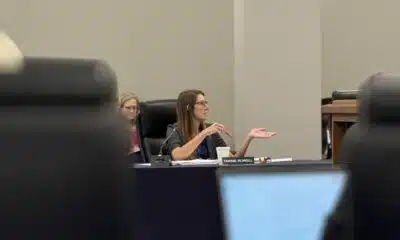Mississippi Today
Medicaid switch confuses beneficiaries, providers and draws feds’ scrutiny
Medicaid switch confuses beneficiaries, providers and draws feds’ scrutiny
During the COVID-19 pandemic, Mississippi was not allowed to kick anyone off Medicaid under federal regulations. In exchange, the state received extra federal funding.
But Mississippi didn’t simply maintain each person’s coverage. Instead, if enrollees on a managed care plan technically lost eligibility (like a new mom more than 60 days after giving birth) or failed to update their information to prove they were still eligible, the Division of Medicaid quietly moved them to “traditional” or “fee-for-service” Medicaid.
That saved the agency money, because it meant that rather than paying a managed care company a monthly rate for each enrollee, it paid providers directly only when the enrollee sought care.
The shift apparently affected tens of thousands of Mississippians, raised concerns with providers who didn’t understand why their patients’ coverage had changed with no public explanation, and drew the attention of federal authorities who wanted to make sure the state was complying with the requirement of maintaining coverage during the COVID-19 public health emergency.
Managed care enrollment has declined from about 490,000 in June 2021 to about 364,000 in September, a drop of 26%. Enrollment is now well below pre-pandemic levels of 434,000 in September 2019, according to statistics published on the Division of Medicaid website.
The change does not appear to have directly altered Medicaid participants’ access to care, because any provider who accepts a managed care plan must also accept traditional Medicaid. But managed care companies tout the benefits they offer members, like 24/7 nurse phone lines, incentives for going to appointments, and free fruits and vegetables, in addition to case management services.
The Division of Medicaid declined to respond to a detailed list of questions from Mississippi Today. The agency said Director Drew Snyder “is not giving interviews at this time,” though he appeared on the Paul Gallo talk show in late August. Instead, the agency provided statements through spokesperson Matt Westerfield.
“We didn’t feel it was responsible to pay per member per month capitation payments to the managed care companies for the continuous enrollment population, particularly at a time when utilization was expected to remain low due to the pandemic,” Westerfield said.
He did not respond to a question asking if the agency could estimate how much money it had saved by shifting coverage during the pandemic.
The three managed care companies – United Health Care, Molina and Magnolia – did not respond to emails and phone calls requesting comment.
Medicaid implemented the switch in a way that left some enrollees confused about whether they had coverage.
Mississippi Today previously reported that postpartum women received notices informing them they had lost eligibility for Medicaid. Though Medicaid later sent a second letter telling them coverage had been reinstated, several women told Mississippi Today they still thought they didn’t have Medicaid any longer, or they never received the second letter. That meant that some Mississippians who were entitled to coverage for things like postpartum depression and chronic conditions thought they didn’t have health insurance and went without care.
Now, it appears people in other eligibility categories also received the letters.
According to documents obtained through a records request, staff at the federal Centers for Medicare and Medicaid Services (CMS) in September asked the Division of Medicaid to pause the notices it was sending “to beneficiaries whom the state has determined no longer meet eligibility requirements”— a much larger number of people than postpartum women.
On Sept. 16 – well over two years into the public health emergency – Snyder told CMS that the automated notices were being paused.
Westerfield did not respond to a question asking exactly how many people had received the letters.
When the COVID-19 pandemic began in March 2020, Congress passed a law requiring states to keep everyone on Medicaid throughout the public health emergency. That meant states had to do something they had never done before: change their systems to ensure people who lost eligibility kept coverage.
Making things more complicated for states, no one knew how long the public health emergency would last. In spring 2020, it appeared possible that the emergency would end within a few months, so it wasn’t clear how long continuous coverage would last, a point Snyder made during his testimony before the Senate Study Group on Women, Children and Families in September.
Medicaid enrollment climbed each month as new people signed on and none of the usual churn took effect.
But for months, the Division of Medicaid did not inform providers or beneficiaries directly about the continuous coverage provision. It did not post a message on its website reminding people that they could use their coverage throughout the pandemic. It never explained continuous coverage in its quarterly bulletins to providers, nor in its news updates.
One provider bulletin in September 2020 described the additional federal funding Mississippi was receiving, increasing the match rate from 77 to 83 cents on the dollar.
“That should help us weather the storm despite an uptick in enrollment,” Director Drew Snyder wrote, not explaining that enrollment was up because no one could lose their Medicaid during the pandemic.
Westerfield said the agency expects providers to check patients’ Medicaid eligibility during or before their appointment, and that providers can check eligibility at any time online. Since providers would be able to see their patients had Medicaid, the agency assumed the continuous coverage requirement wouldn’t make a difference on their end.
“Any insinuation that the Division of Medicaid attempted to conceal information about the availability of continuous enrollment for (the) duration of the public health emergency is simply not true,” Westerfield said.
In September 2022, a website post titled "Preparing for the COVID-19 Public Health Emergency Unwinding" mentioned continuous coverage and urged stakeholders to help get the message out.
But some providers told Mississippi Today they learned about continuous coverage through word of mouth.
Dr. Emily Johnson, an OB-GYN in the Jackson area, learned about it for the first time from a Mississippi Today reporter in October. She did not know that her patients are not losing coverage 60 days postpartum as they normally do.
“It’s always been an issue that women are very focused, that their Medicaid is going to run out and they want to get their postpartum contraception plan established before their Medicaid runs out,” she said. “I had no idea that that was no longer a pressure – that once their six-week or eight-week time was over, that they had continued access.
“It’s really sad that this is the first time I’m hearing about that,” she said.
Enrollment in managed care peaked at 490,408 people in June 2021. The total number of Medicaid enrollees was 820,602, according to statistics on the Medicaid website.
Then, it began to fall, apparently because Medicaid began conducting eligibility redeterminations and moving people off of managed care if they would have been disqualified without the PHE, or failed to update their information. Westerfield did not respond to a question from Mississippi Today asking why managed care enrollment started to fall when it did.
By September 2022, managed care enrollment had fallen 26% from its June 2021 peak. Total Medicaid enrollment was just over 867,000.
Doctors started to notice that some of their patients’ coverage status had changed.
Leaders of the Mississippi Chapter of the American Academy of Pediatrics wrote to Snyder in May 2022 asking what was going on. Physicians had reported “some pediatric patients are being transferred from the MississippiCAN programs to fee-for-service Medicaid."
“Unfortunately, the families are unaware of why this is happening,” wrote Hattiesburg pediatrician and chapter President Dr. Anita Henderson in an email obtained by Mississippi Today through a records request. “Recipients rotating off and on to the MississippiCAN or the FFS program are at risk of losing continuity of care, creating confusion for their families, and suffering avoidable medical complications. In addition, this can cause undue administrative and financial burdens for healthcare providers and possibly to the Division of Medicaid.”
Snyder responded that same day. He wrote that when Medicaid reviewed eligibility before the public health emergency, anyone who was not eligible or who didn’t respond to requests for documentation would lose their coverage, but that could no longer happen.
“During the PHE, when the state conducts renewals, beneficiaries who are determined not eligible or who are not responding to requests for documentation get to keep their Medicaid coverage, but still may be moved from a managed care delivery system to fee-for-service,” he said.
Dr. Tami Brooks, a Starkville pediatrician, was CC’d in the email chain between Henderson and Snyder. Brooks is part of a group of pediatricians that holds regular meetings with Medicaid staff to discuss issues and concerns. She said she was glad that the switch to fee-for-service did not affect children’s access to health care.
But she wants to make sure people understand that if they are on fee-for-service Medicaid, it means the agency has determined they’re not eligible, and the only thing protecting their coverage is the public health emergency.
“We’re letting our providers know, if you see a fee-for-service child, that likely means that mom needs to get back and recertify them,” Brooks said.
Federal authorities in early September reached out to the Division of Medicaid with concerns about how Mississippi was handling postpartum women’s Medicaid coverage during the emergency.
“We received a complaint regarding the state’s 60th day postpartum period policy,” wrote a Medicaid official in an email to Snyder. “We would like to set up a call to confirm our understanding on how the state processes coverage after the 60th day postpartum period.”
But within a few days, and after a call between Medicaid officials, including Snyder and CMS staff, the email correspondence broadened to a discussion of the notices Medicaid was sending people who were switched off of managed care coverage during the pandemic, not just postpartum women.
The notice people got when they were switched off managed care was headlined “MississippiCAN TERMINATION NOTICE – Loss of Eligibility.” It contained no information about continuous coverage during the public health emergency.
In an email, federal officials listed two regulations that they wanted to make sure Mississippi had not been violating when it moved people off managed care during the pandemic.
One rule requires managed care companies to inform beneficiaries of “significant” changes to their coverage at least 30 days in advance.
“We assume these enrollees received advanced notice of the transition back to FFS, but would ask the state to confirm that notices were sent to the managed care enrollees at least 30 days in advance of the transition,” a CMS official wrote.
But Mississippi Medicaid Deputy Administrator for Health Policy and Services Wil Ervin wrote that this rule didn’t apply because the agency found it only concerned "significant" changes to information included in the managed care enrollees' handbook. Since the shift didn't affect anything in the handbook but instead changed enrollees' coverage entirely, the agency said it did not need to provide advance notice.
CMS also asked Mississippi Medicaid to confirm that the transition from managed care to fee-for-service Medicaid had not disrupted beneficiaries’ access to care. Ervin said it had not.
After the meeting with the feds, Medicaid changed the managed care termination notice letter to clearly describe the recipient’s ongoing coverage.
“This letter is to inform you that you are no longer eligible for MississippiCAN,” the revised notice read. “You will continue to receive full Medicaid benefits through original Medicaid until the end of the federal COVID-19 public health emergency.”
It’s not clear whether Medicaid is sending people the revised notices or has paused them entirely. Westerfield did not respond to that question from Mississippi Today.
“CMS has met with Mississippi several times since the problem was identified to provide technical assistance regarding Medicaid notices,” a CMS spokesperson told Mississippi Today in late October. “The state agreed to pause the use of these notices pending further internal review and discussion.”
The spokesperson did not respond to Mississippi Today’s request to interview CMS staffers who participated in the meetings with Mississippi Medicaid.
The public health emergency is currently slated to expire in mid-January. But the Biden administration has said it will give states at least 60 days’ notice before lifting the emergency, and since no notice arrived in mid-November, it will be extended again.
When it ends, Mississippi and every other state will begin kicking people off Medicaid rolls once again. Nationally, between 5 and 14 million people could lose their coverage, according to the health policy nonprofit KFF.
States will have at least a year to complete their review of enrollees’ eligibility, but they have a good deal of flexibility in how they conduct the reviews and how much time they take.
As of November, Mississippi still did not have a plan for this process, called the “unwinding,” Westerfield told Mississippi Today.According to KFF, 17 states lack such a plan currently.
“We have been in the process of developing a plan while actively reviewing all CMS guidance surrounding the PHE,” he said. “We are also aware that CMS has committed to giving states 60 days advanced (sic) notice before lifting the PHE. Upon completion, we will post our unwinding plan on our website.”
Doctors around Mississippi are concerned that when the public health emergency ends, hundreds of thousands of patients could quickly lose Medicaid coverage.
And people who were switched from managed care to fee-for-service could more quickly lose coverage, since the state has already determined they’re no longer eligible or that they need to update their information to prove they still qualify.
Westerfield did not respond when asked whether the agency will prioritize ending coverage for people who have been moved to fee-for-service Medicaid.
“We are trying as pediatricians to try and get parents to make sure they have their information and go ahead and turn that back into the state,” Henderson told Mississippi Today in September. “We know there will be a grace period with the Division of Medicaid … But we certainly are concerned that when the PHE lifts, we will all of a sudden have thousands of children who may lose benefits, lose coverage and lose access to health care, which would obviously be detrimental to their health and wellbeing.”
This article first appeared on Mississippi Today and is republished here under a Creative Commons license.
Did you miss our previous article…
https://www.biloxinewsevents.com/?p=196916
Mississippi Today
Presidents are taking longer to declare major natural disasters. For some, the wait is agonizing
TYLERTOWN — As an ominous storm approached Buddy Anthony’s one-story brick home, he took shelter in his new Ford F-250 pickup parked under a nearby carport.
Seconds later, a tornado tore apart Anthony’s home and damaged the truck while lifting it partly in the air. Anthony emerged unhurt. But he had to replace his vehicle with a used truck that became his home while waiting for President Donald Trump to issue a major disaster declaration so that federal money would be freed for individuals reeling from loss. That took weeks.
“You wake up in the truck and look out the windshield and see nothing. That’s hard. That’s hard to swallow,” Anthony said.
Disaster survivors are having to wait longer to get aid from the federal government, according to a new Associated Press analysis of decades of data. On average, it took less than two weeks for a governor’s request for a presidential disaster declaration to be granted in the 1990s and early 2000s. That rose to about three weeks during the past decade under presidents from both major parties. It’s taking more than a month, on average, during Trump’s current term, the AP found.
The delays mean individuals must wait to receive federal aid for daily living expenses, temporary lodging and home repairs. Delays in disaster declarations also can hamper recovery efforts by local officials uncertain whether they will receive federal reimbursement for cleaning up debris and rebuilding infrastructure. The AP collaborated with Mississippi Today and Mississippi Free Press on the effects of these delays for this report.
“The message that I get in the delay, particularly for the individual assistance, is that the federal government has turned its back on its own people,” said Bob Griffin, dean of the College of Emergency Preparedness, Homeland Security and Cybersecurity at the University at Albany in New York. “It’s a fundamental shift in the position of this country.”
The wait for disaster aid has grown as Trump remakes government
The Federal Emergency Management Agency often consults immediately with communities to coordinate their initial disaster response. But direct payments to individuals, nonprofits and local governments must wait for a major disaster declaration from the president, who first must receive a request from a state, territory or tribe. Major disaster declarations are intended only for the most damaging events that are beyond the resources of states and local governments.
Trump has approved more than two dozen major disaster declarations since taking office in January, with an average wait of almost 34 days after a request. That ranged from a one-day turnaround after July’s deadly flash flooding in Texas to a 67-day wait after a request for aid because of a Michigan ice storm. The average wait is up from a 24-day delay during his first term and is nearly four times as long as the average for former Republican President George H.W. Bush, whose term from 1989-1993 coincided with the implementation of a new federal law setting parameters for disaster determinations.
The delays have grown over time, regardless of the party in power. Former Democratic President Joe Biden, in his last year in office, averaged 26 days to declare major disasters — longer than any year under former Democratic President Barack Obama.

FEMA did not respond to the AP’s questions about what factors are contributing to the trend.
Others familiar with FEMA noted that its process for assessing and documenting natural disasters has become more complex over time. Disasters have also become more frequent and intense because of climate change, which is mostly caused by the burning of fuels such as gas, coal and oil.
The wait for disaster declarations has spiked as Trump’s administration undertakes an ambitious makeover of the federal government that has shed thousands of workers and reexamined the role of FEMA. A recently published letter from current and former FEMA employees warned the cuts could become debilitating if faced with a large-enough disaster. The letter also lamented that the Trump administration has stopped maintaining or removed long-term planning tools focused on extreme weather and disasters.
Shortly after taking office, Trump floated the idea of “getting rid” of FEMA, asserting: “It’s very bureaucratic, and it’s very slow.”
FEMA’s acting chief suggested more recently that states should shoulder more responsibility for disaster recovery, though FEMA thus far has continued to cover three-fourths of the costs of public assistance to local governments, as required under federal law. FEMA pays the full cost of its individual assistance.
Former FEMA Administrator Pete Gaynor, who served during Trump’s first term, said the delay in issuing major disaster declarations likely is related to a renewed focus on making sure the federal government isn’t paying for things state and local governments could handle.
“I think they’re probably giving those requests more scrutiny,” Gaynor said. “And I think it’s probably the right thing to do, because I think the (disaster) declaration process has become the ‘easy button’ for states.”
The Associated Press on Monday received a statement from White House spokeswoman Abigail Jackson in response to a question about why it is taking longer to issue major natural disaster declarations:
“President Trump provides a more thorough review of disaster declaration requests than any Administration has before him. Gone are the days of rubber stamping FEMA recommendations – that’s not a bug, that’s a feature. Under prior Administrations, FEMA’s outsized role created a bloated bureaucracy that disincentivized state investment in their own resilience. President Trump is committed to right-sizing the Federal government while empowering state and local governments by enabling them to better understand, plan for, and ultimately address the needs of their citizens. The Trump Administration has expeditiously provided assistance to disasters while ensuring taxpayer dollars are spent wisely to supplement state actions, not replace them.”

In Mississippi, frustration festered during wait for aid
The tornado that struck Anthony’s home in rural Tylertown on March 15 packed winds up to 140 mph. It was part of a powerful system that wrecked homes, businesses and lives across multiple states.
Mississippi’s governor requested a federal disaster declaration on April 1. Trump granted that request 50 days later, on May 21, while approving aid for both individuals and public entities.
On that same day, Trump also approved eight other major disaster declarations for storms, floods or fires in seven other states. In most cases, more than a month had passed since the request and about two months since the date of those disasters.
If a presidential declaration and federal money had come sooner, Anthony said he wouldn’t have needed to spend weeks sleeping in a truck before he could afford to rent the trailer where he is now living. His house was uninsured, Anthony said, and FEMA eventually gave him $30,000.
In nearby Jayess in Lawrence County, Dana Grimes had insurance but not enough to cover the full value of her damaged home. After the eventual federal declaration, Grimes said FEMA provided about $750 for emergency expenses, but she is now waiting for the agency to determine whether she can receive more.

“We couldn’t figure out why the president took so long to help people in this country,” Grimes said. “I just want to tie up strings and move on. But FEMA — I’m still fooling with FEMA.”
Jonathan Young said he gave up on applying for FEMA aid after the Tylertown tornado killed his 7-year-old son and destroyed their home. The process seemed too difficult, and federal officials wanted paperwork he didn’t have, Young said. He made ends meet by working for those cleaning up from the storm.
“It’s a therapy for me,” Young said, “to pick up the debris that took my son away from me.”
Historically, presidential disaster declarations containing individual assistance have been approved more quickly than those providing assistance only to public entities, according to the AP’s analysis. That remains the case under Trump, though declarations for both types are taking longer.
About half the major disaster declarations approved by Trump this year have included individual assistance.
Some people whose homes are damaged turn to shelters hosted by churches or local nonprofit organizations in the initial chaotic days after a disaster. Others stay with friends or family or go to a hotel, if they can afford it.
But some insist on staying in damaged homes, even if they are unsafe, said Chris Smith, who administered FEMA’s individual assistance division under three presidents from 2015-2022. If homes aren’t repaired properly, mold can grow, compounding the recovery challenges.

That’s why it’s critical for FEMA’s individual assistance to get approved quickly — ideally, within two weeks of a disaster, said Smith, who’s now a disaster consultant for governments and companies.
“You want to keep the people where they are living. You want to ensure those communities are going to continue to be viable and recover,” Smith said. “And the earlier that individual assistance can be delivered … the earlier recovery can start.”
In the periods waiting for declarations, the pressure falls on local officials and volunteers to care for victims and distribute supplies.
In Walthall County, where Tylertown is, insurance agent Les Lampton remembered watching the weather news as the first tornado missed his house by just an eighth of a mile. Lampton, who moonlights as a volunteer firefighter, navigated the collapsed trees in his yard and jumped into action. About 45 minutes later, the second tornado hit just a mile away.
“It was just chaos from there on out,” Lampton said.
Walthall County, with a population of about 14,000, hasn’t had a working tornado siren in about 30 years, Lampton said. He added there isn’t a public safe room in the area, although a lot of residents have ones in their home.
Rural areas with limited resources are hit hard by delays in receiving funds through FEMA’s public assistance program, which, unlike individual assistance, only reimburses local entities after their bills are paid. Long waits can stoke uncertainty and lead cost-conscious local officials to pause or scale-back their recovery efforts.

In Walthall County, officials initially spent about $700,000 cleaning up debris, then suspended the cleanup for more than a month because they couldn’t afford to spend more without assurance they would receive federal reimbursement, said county emergency manager Royce McKee. Meanwhile, rubble from splintered trees and shattered homes remained piled along the roadside, creating unsafe obstacles for motorists and habitat for snakes and rodents.
When it received the federal declaration, Walthall County took out a multimillion-dollar loan to pay contractors to resume the cleanup.
“We’re going to pay interest and pay that money back until FEMA pays us,” said Byran Martin, an elected county supervisor. “We’re hopeful that we’ll get some money by the first of the year, but people are telling us that it could be [longer].”
Lampton, who took after his father when he joined the volunteer firefighters 40 years ago, lauded the support of outside groups such as Cajun Navy, Eight Days of Hope, Samaritan’s Purse and others. That’s not to mention the neighbors who brought their own skid steers and power saws to help clear trees and other debris, he added.
“That’s the only thing that got us through this storm, neighbors helping neighbors,” Lampton said. “If we waited on the government, we were going to be in bad shape.”
Lieb reported from Jefferson City, Missouri, and Wildeman from Hartford, Connecticut.
Update 98/25: This story has been updated to include a White House statement released after publication.
This article first appeared on Mississippi Today and is republished here under a Creative Commons Attribution-NoDerivatives 4.0 International License.
The post Presidents are taking longer to declare major natural disasters. For some, the wait is agonizing appeared first on mississippitoday.org
Note: The following A.I. based commentary is not part of the original article, reproduced above, but is offered in the hopes that it will promote greater media literacy and critical thinking, by making any potential bias more visible to the reader –Staff Editor.
Political Bias Rating: Center-Left
This article presents a critical view of the Trump administration’s handling of disaster declarations, highlighting delays and their negative impacts on affected individuals and communities. It emphasizes concerns about government downsizing and reduced federal support, themes often associated with center-left perspectives that favor robust government intervention and social safety nets. However, it also includes statements from Trump administration officials defending their approach, providing some balance. Overall, the tone and framing lean slightly left of center without being overtly partisan.
Mississippi Today
Northeast Mississippi speaker and worm farmer played key role in Coast recovery after Hurricane Katrina
The 20th anniversary of Hurricane Katrina slamming the Mississippi Gulf Coast has come and gone, rightfully garnering considerable media attention.
But still undercovered in the 20th anniversary saga of the storm that made landfall on Aug. 29, 2005, and caused unprecedented destruction is the role that a worm farmer from northeast Mississippi played in helping to revitalize the Coast.
House Speaker Billy McCoy, who died in 2019, was a worm farmer from the Prentiss, not Alcorn County, side of Rienzi — about as far away from the Gulf Coast as one could be in Mississippi.
McCoy grew other crops, but a staple of his operations was worm farming.
Early after the storm, the House speaker made a point of touring the Coast and visiting as many of the House members who lived on the Coast as he could to check on them.
But it was his action in the forum he loved the most — the Mississippi House — that is credited with being key to the Coast’s recovery.
Gov. Haley Barbour had called a special session about a month after the storm to take up multiple issues related to Katrina and the Gulf Coast’s survival and revitalization. The issue that received the most attention was Barbour’s proposal to remove the requirement that the casinos on the Coast be floating in the Mississippi Sound.
Katrina wreaked havoc on the floating casinos, and many operators said they would not rebuild if their casinos had to be in the Gulf waters. That was a crucial issue since the casinos were a major economic engine on the Coast, employing an estimated 30,000 in direct and indirect jobs.
It is difficult to fathom now the controversy surrounding Barbour’s proposal to allow the casinos to locate on land next to the water. Mississippi’s casino industry that was birthed with the early 1990s legislation was still new and controversial.
Various religious groups and others had continued to fight and oppose the casino industry and had made opposition to the expansion of gambling a priority.
Opposition to casinos and expansion of casinos was believed to be especially strong in rural areas, like those found in McCoy’s beloved northeast Mississippi. It was many of those rural areas that were the homes to rural white Democrats — now all but extinct in the Legislature but at the time still a force in the House.
So, voting in favor of casino expansion had the potential of being costly for what was McCoy’s base of power: the rural white Democrats.
Couple that with the fact that the Democratic-controlled House had been at odds with the Republican Barbour on multiple issues ranging from education funding to health care since Barbour was inaugurated in January 2004.
Barbour set records for the number of special sessions called by the governor. Those special sessions often were called to try to force the Democratic-controlled House to pass legislation it killed during the regular session.
The September 2005 special session was Barbour’s fifth of the year. For context, current Gov. Tate Reeves has called four in his nearly six years as governor.
There was little reason to expect McCoy to do Barbour’s bidding and lead the effort in the Legislature to pass his most controversial proposal: expanding casino gambling.
But when Barbour ally Lt. Gov. Amy Tuck, who presided over the Senate, refused to take up the controversial bill, Barbour was forced to turn to McCoy.
The former governor wrote about the circumstances in an essay he penned on the 20th anniversary of Hurricane Katrina for Mississippi Today Ideas.
“The Senate leadership, all Republicans, did not want to go first in passing the onshore casino law,” Barbour wrote. “So, I had to ask Speaker McCoy to allow it to come to the House floor and pass. He realized he should put the Coast and the state’s interests first. He did so, and the bill passed 61-53, with McCoy voting no.
“I will always admire Speaker McCoy, often my nemesis, for his integrity in putting the state first.”
Incidentally, former Rep. Bill Miles of Fulton, also in northeast Mississippi, was tasked by McCoy with counting, not whipping votes, to see if there was enough support in the House to pass the proposal. Not soon before the key vote, Miles said years later, he went to McCoy and told him there were more than enough votes to pass the legislation so he was voting no and broached the idea of the speaker also voting no.
It is likely that McCoy would have voted for the bill if his vote was needed.
Despite his no vote, the Biloxi Sun Herald newspaper ran a large photo of McCoy and hailed the Rienzi worm farmer as a hero for the Mississippi Gulf Coast.
This article first appeared on Mississippi Today and is republished here under a Creative Commons Attribution-NoDerivatives 4.0 International License.
The post Northeast Mississippi speaker and worm farmer played key role in Coast recovery after Hurricane Katrina appeared first on mississippitoday.org
Note: The following A.I. based commentary is not part of the original article, reproduced above, but is offered in the hopes that it will promote greater media literacy and critical thinking, by making any potential bias more visible to the reader –Staff Editor.
Political Bias Rating: Centrist
The article presents a factual and balanced account of the political dynamics surrounding Hurricane Katrina recovery efforts in Mississippi, focusing on bipartisan cooperation between Democratic and Republican leaders. It highlights the complexities of legislative decisions without overtly favoring one party or ideology, reflecting a neutral and informative tone typical of centrist reporting.
Mississippi Today
PSC moves toward placing Holly Springs utility into receivership
NEW ALBANY — After five hours in a courtroom where attendees struggled to find standing room, the Mississippi Public Service Commission voted to petition a judge to put the Holly Springs Utility Department into a receivership.
The PSC held the hearing Thursday about a half hour drive west from Holly Springs in New Albany, known as “The Fair and Friendly City.” Throughout the proceedings, members of the PSC, its consultants and Holly Springs officials emphasized there was no precedent for what was going on.
The city of Holly Springs has provided electricity through a contract with the Tennessee Valley Authority since 1935. It serves about 12,000 customers, most of whom live outside the city limits. While current and past city officials say the utility’s issues are a result of financial negligence over many years, the service failures hit a boiling point during a 2023 ice storm where customers saw outages that lasted roughly two weeks as well as power surges that broke their appliances.
Those living in the service area say those issues still occur periodically, in addition to infrequent and inaccurate billing.
“I moved to Marshall County in 2020 as a place for retirement for my husband and I, and it’s been a nightmare for five years,” customer Monica Wright told the PSC at Thursday’s hearing. “We’ve replaced every electronic device we own, every appliance, our well pump and our septic pumps. It has financially broke us.
“We’re living on prayers and promises, and we need your help today.”

Another customer, Roscoe Sitgger of Michigan City, said he recently received a series of monthly bills between $500 and $600.
Following a scathing July report by Silverpoint Consulting that found Holly Springs is “incapable” of running the utility, the three-member PSC voted unanimously on Thursday to determine the city isn’t providing “reasonably adequate service” to its customers. That language comes from a 2024 state bill that gave the commission authority to investigate the utility.
The bill gives a pathway for temporarily removing the utility’s control from the city, allowing the PSC to petition a chancery judge to place the department into the hands of a third party. The PSC voted unanimously to do just that.

Thursday’s hearing gave the commission its first chance to direct official questions at Holly Springs representatives. Newly elected Mayor Charles Terry, utility General Manager Wayne Jones and City Attorney John Keith Perry fielded an array of criticism from the PSC. In his rebuttal, Perry suggested that any solution — whether a receivership or selling the utility — would take time to implement, and requested 24 months for the city to make incremental improvements. Audience members shouted, “No!” as Perry spoke.
“We are in a crisis now,” responded Northern District Public Service Commissioner Chris Brown. “To try to turn the corner in incremental steps is going to be almost impossible.”

It’s unclear how much it would cost to fix the department’s long list of ailments. In 2023, TVPPA — a nonprofit that represents TVA’s local partners — estimated Holly Springs needs over $10 million just to restore its rights-of-way, and as much as $15 million to fix its substations. The department owes another $10 million in debt to TVA as well as its contractors, Brown said.
“The city is holding back the growth of the county,” said Republican Sen. Neil Whaley of Potts Camp, who passionately criticized the Holly Springs officials sitting a few feet away. “You’ve got to do better, you’ve got to realize you’re holding these people hostage, and it’s not right and it’s not fair… They are being represented by people who do not care about them as long as the bill is paid.”
In determining next steps, Silverpoint Principal Stephanie Vavro told the PSC it may be hard to find someone willing to serve as receiver for the utility department, make significant investments and then hand the keys back to the city. The 2024 bill, Vavro said, doesn’t limit options to a receivership, and alternatives could include condemning the utility or finding a nearby utility to buy the service area.

Answering questions from Central District Public Service Commissioner De’Keither Stamps, Vavro said it’s unclear how much the department is worth, adding an engineer’s study would be needed to come up with a number.
Terry, who reminded the PSC he’s only been Holly Springs’ mayor for just over 60 days, said there’s no way the city can afford the repair costs on its own. The city’s median income is about $47,000, roughly $8,000 less than the state’s as a whole.
This article first appeared on Mississippi Today and is republished here under a Creative Commons Attribution-NoDerivatives 4.0 International License.
The post PSC moves toward placing Holly Springs utility into receivership appeared first on mississippitoday.org
Note: The following A.I. based commentary is not part of the original article, reproduced above, but is offered in the hopes that it will promote greater media literacy and critical thinking, by making any potential bias more visible to the reader –Staff Editor.
Political Bias Rating: Centrist
This article presents a factual and balanced account of the situation involving the Holly Springs Utility Department and the Mississippi Public Service Commission. It includes perspectives from various stakeholders, such as city officials, residents, and state commissioners, without showing clear favoritism or ideological slant. The focus is on the practical challenges and financial issues faced by the utility, reflecting a neutral stance aimed at informing readers rather than advocating a particular political viewpoint.
-
Mississippi Today6 days ago
Brandon residents want answers, guarantees about data center
-
News from the South - Texas News Feed5 days ago
Texas high school football scores for Thursday, Sept. 4
-
Our Mississippi Home6 days ago
Southern Miss Faculty and Student Contribute to Groundbreaking NOAA-Funded Plastic Cleanup
-
The Conversation6 days ago
AI is transforming weather forecasting − and that could be a game changer for farmers around the world
-
News from the South - Oklahoma News Feed7 days ago
Family sues Roblox, accusing them of failing to protect kids from predators
-
Mississippi News Video7 days ago
Hattiesburg Fire Department to implement new alert system
-
News from the South - Arkansas News Feed7 days ago
Arkansas correction division to enter settlement over disability law violations
-
News from the South - Oklahoma News Feed7 days ago
Thousands of State Employees Still Working Remotely
















































